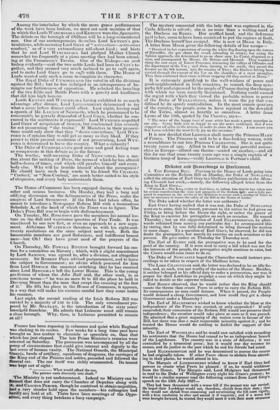France has been reposing in calmness and quiet while England
was shaking to its centre. Few weeks for a long time past have brought us less matter to chronicle or speculate on, than that
' which has just elapsed. The late Prime Minister's remains were interred on Saturday. The procession was accompanied by all the pomp uip of circumstance that could give interest and dignity to the Last scene of human vanity. The National Guards, the Municipal Guards, bands of artillery, squadrons of dragoons, the carriages of the King and of the Princes and nobles, preceded and followed the Enteral car. The car itself was richly ornamented. Its tenant -was kept out of sight :
What would offend the eye, The painter casts discreetly into shade."
The Ministry is yet undetermined. Indeed no Ministry can be formed that does not carry the Chamber of Deputies along with iti; and CASIMIR PERIER, though he contrived to obtain majorities, had a very slender hold upon the members—his colleagues had hardly any hold at all. Thdre have "been meetings of the Oppo- sition, and every thing betokens a busy campaign. The mystery connected with the lady that was captured in the Carlo Alberto is solved; she is no more than a waiting-maid of the Duchess DE BERRI. Her muffled head, and the deference paid to her, seem to have been contrived to put the captors at fault. The Duchess herself has escaped. She is now at Massa in Italy. A letter from Massa gives the following details of her escape- " Deceived in her expectation of seeing the white flag floating upon the towers of Marseilles, she put about the vessel, intending to return; but seeing the Sphinx approach, she determined to go on shore near La Ciotat, disguised as a man, and accompanied by Messrs. De Brissac and Mesnard. They wandered along the east coast of Lower Provence, traversing the valleys of 011ioules and the department of the Var ; and then, turning to the north, they passed the frontier on the 9th instant, into the country of Nice; the Duchess having been carried through the torrent of the Var on the shoulders of a stout smuggler. They then continued their route without stopping till they arrived at Massa."
It is extremely gratifying to the well-wishers of peace and good-neighbourhood in both countries, to remark the deep sym- pathy felt and expressed by the people of France during the changes with which we were recently threatened. Nothing could exceed the regret with which they viewed the probable return to power of the Duke of WELLINGTON, unless it were the joy that was diffused by its speedy contradiction. In the most remote quarters of the country, the people seem to have rejoiced at the downfall of the Tories, almost as heartily as ourselves. A letter from Lyons of the 19th, quoted by the Courier, says- " The news of the happy issue of your crisis has made a great sensation in our city. Every body was so happy to see the news confirmed, that I was stopped on all sides in the streets, in order to show the letter. I can assure you that Lyons exhibits the most lively joy on the occasion."
It is now decided that LEOPOLD shall marry the Princess MARY of France. The Princess is said to be a fine-looking woman, with a resemblance to our late Princess CHARLOTTE. She is not quite twenty years of age. Allied to two of the most powerful monar- chies in Europe—offered one throne—seated mf.another,—and all this for one that some twenty years ago was a simple captain of a German troop of horse,—verily LEOPOLD is Fortune's child.


























 Previous page
Previous page